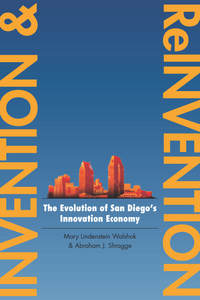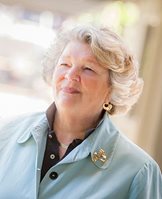16 December 2013
Historical study reveals five characteristics necessary for cities to prosper in 21st century
Visionary goals must be foremost for any large American city to prosper, according to the authors of "Invention & Re-Invention: The Evolution of San Diego's Innovation Economy," a newly published book that traces one city's changing sociological, political and economic trends, dating from the 1880s through contemporary times and beyond.

Using their hometown of San Diego as an historical backdrop, authors Mary Lindenstein Walshok and Abraham J. Shragge contend that while geographic advantages rate high, factors such as the core values of early founders, the ability to steer new paths to growth, and how a city cultivates its resources and leadership are baselines for any city's predicted level of prosperity.
According to Walshok and Shragge, five major characteristics of civic culture are necessary to move forward:
1) A risk-oriented culture adept at managing uncertainty. A central feature of San Diego's experimental history and prevalence of small industries is a civic culture and business community that embraces risk.
2) Entrepreneurial talent: Civic leaders, scientists, business professional. San Diego's long history of creating opportunities for people who want to challenge the status quo or create something new has resulted in an unusually large aggregation of entrepreneurial civic, business, and scientific leaders.
3) Integrative civic platforms. San Diego's civic culture is highly inclusive, cross-functional and interdisciplinary. Institutions that span the boundaries between communities of ideas and practice have proliferated; in many other regions such entities continue to be siloed.
4) Multiple gateways through which ideas and opportunities can be developed. There is no one Establishment, Inc., in San Diego. There are actually many centers of gravity vis-a-vis leadership and access to resources. San Diego is characterized by an open innovation environment that allows people to easily move among social groups and within hierarchies.
5) A culture of reinvestment: Time and money. The absence of multinational corporations until recently, the century-long reliance on the federal government as a key customer, and the lack of accumulated family wealth have required a civic culture characterized by people investing significant amounts of personal time and resources to achieve civic goals. This is enhanced by the fact that those who come to San Diego stay because of their attachment to the place.
Valuable lessons can be gleaned from San Diego, which despite its cul-de-sac locale at the bottom of California and long-suffering status as step-sister to Los Angeles, its northward megalopolis, has grown into the nation's sixth largest U.S. city with a diverse and robust hi-tech base.
How San Diego got that way — a world-class bioscience hub and intellectual mecca that complements its largely military and tourism base of the 1950s and '60s — is the authors' well-researched tale of how their adopted hometown has successfully reinvented itself.
As they point out, "Contemporary San Diego is a product of a distinctive pattern of evolutionary development…a community that continuously repurposes its assets and realigns its economic development strategies and organization to sustain prosperity over time."
Walshok and Shragge's book is their first collaborative work, based on their pride and sense of fealty to the city they've called home for much of their adult lives.
Published by Stanford Business Books, an imprint of Stanford University Press, "Invention & Re-Invention: The Evolution of San Diego's Innovation Economy" is sure to spark debate among big-city leaders — business, civic, cultural, sociological, economic — looking for substantive guideposts for their own city's past, present and future
About the Authors:

Mary Lindenstein Walshok is Associate Vice Chancellor of Public Programs, Dean of UC San Diego Extension and Adjunct Professor of Sociology at UC San Diego. She is also co-founder of CONNECT, a renowned innovation cluster development organization based in La Jolla.
Abraham J. Shragge is Visiting Professor at the Korea Development Institute School of Public Policy and Management. He is also curator of the Veterans Museum and Memorial Center.